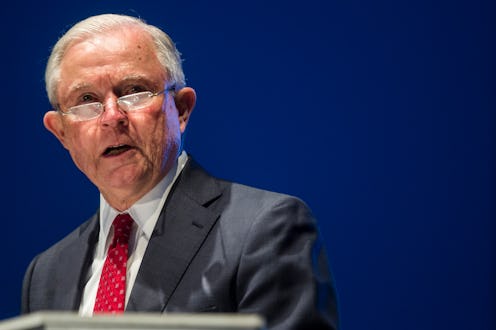
It's not secret that President Donald Trump has repeatedly expressed his discontent with the ongoing special counsel investigation. Now, amidst new reports, you may be wondering whether Trump really asked Jeff Sessions to un-recuse himself from the investigation. According to a New York Times report, the president reportedly directly asked Sessions to reverse his recusal decision during a dinner at Mar-a-Lago. Bustle has reached out to the White House regarding this report, but Trump has previously denied obstructing justice in any way.
Attorney General Jeff Sessions recused himself from special counsel Robert Mueller's Russia investigation back in March of 2017. Sessions' recusal came after the attorney general revealed contacts with the Russian ambassador that he had previously not disclosed. President Trump was reportedly very unhappy with Sessions' decision to recuse himself. Indeed, as Reuters reported, in June 2017 Sessions reportedly even offered to resign amidst significant tensions between himself and the president. Trump supposedly refused his resignation.
Now, it seems that, in addition to being frustrated with Sessions, Trump reportedly actively tried to get Sessions to un-recuse himself from the investigation. According to the New York Times, Trump wanted someone who he considered loyal to him to oversee the special counsel's probe. Sessions ultimately declined to overturn his decision, the report noted.
As the paper indicated, this interaction between Trump and Sessions is reportedly being investigated by special counsel Mueller. As the New York Times noted, this indicates that Mueller's investigation of whether or not Trump obstructed justice goes beyond his firing of former FBI Director James Comey — and includes his interactions with and reported asks of Attorney General Sessions. It also means that Sessions is likely a key witness in Mueller's investigation. Trump has denied allegations of obstruction of justice. At an unexpected press conference in January, according to The Hill, Trump said, “There’s been no collusion whatsoever." Referring to potentially being questioned by Mueller, “There’s no obstruction whatsoever. And I’m looking forward to it.” And for the record, Trump has also denied that there was any collusion between his campaign and Russia. The Kremlin has similarly defended itself against the allegations.
The New York Times noted on Tuesday that one of Trump's current lawyers and former mayor of New York City, Rudy Giuliani, said he has not spoken with Trump about Sessions' recusal. However, Giuliani did say that asking Sessions to reverse his recusal decision would fall within the scope of the president's powers. As Giuliani told the paper, "‘Unrecuse’ doesn’t say, ‘Bury the investigation.’ It says on the face of it: Take responsibility for it and handle it correctly."
Trump, along with Giuliani, is reportedly currently in the process of negotiating terms of an interview with special counsel Mueller. As CBS reported, Giuliani described during a television interview that the president seems to see the Mueller interview as key to wrapping up the investigation and is very seriously considering consenting to it. However, the president wants to ensure that his terms are accepted before he agrees to an interview with the special counsel.
Time will tell if and how the revelation about Trump's reported decision to ask Sessions to recuse himself will affect the prospects of the president agreeing to an interview with Mueller. In the meantime, Mueller will likely be closely watching to see if the White House decides to comment publicly on the matter.